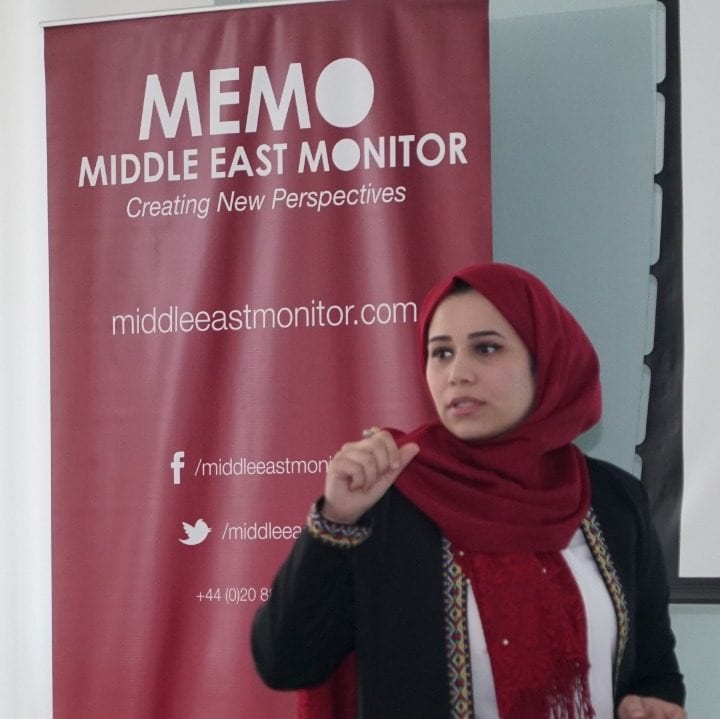An exciting project is unfolding between children in Brazil and the Gaza Strip, Palestine, who are exchanging letters to share their hopes and dreams. Conceived by award-winning journalist Angela Bastos, the letter-writing project brings together children from different backgrounds who are united in experience under the umbrella of the coronavirus pandemic.
This week, Bastos saw her multimedia report “Letters in the pandemic” published in the NSC daily newspaper in Brazil’s Santa Catarina State. She told me how it came about.
![Pedro (left) a Brazilian boy, sent a letter to Rama, a palestinian girl in Lebanon, September 2020 [Angela Bastos]](https://i0.wp.com/www.middleeastmonitor.com/wp-content/uploads/2020/10/Pedro-left-a-Brazilian-boy-sent-a-letter-to-Rama-a-palestinian-girl-in-Lebanon-September-2020-Angela-Bastos.jpg?resize=920%2C603&ssl=1)
Pedro (left) a Brazilian boy, sent a letter to Rama, a palestinian girl in Lebanon, September 2020 [Angela Bastos]
In her project, Bastos contrasts the living experiences of Brazilian children with their counterparts in the Middle East, building the narrative around solidarity and raising awareness of the challenges and unsanitary conditions of refugee camps through the exchange of letters and drawings. “Whether in Brazil, Lebanon or the Gaza Strip, we can see how much children can look at life more lightly than adults, despite the difficulties imposed on them. Of course, in the case of refugee camps, it is aggravated by problems such as hardship, hunger and homelessness.”

With the help of some friends, Bastos selected a group of 22 children ranging from 8 to 17 years old who were ready to exchange letters. “I talked to friends who had children and explained my idea to them. The response was brilliant; they wanted to help in what is a wonderful humanitarian cause.” One six-year-old asked his mother to buy a card, while a 16-year-old wanted to play a song on his guitar; others asked their parents to record special videos.
‘More than a team, it is an entire people’: 100 years of Palestinian football in Chile
Their letters included poetry and drawings, as well as their hopes and dreams. Jana in Palestine, for example, wants to travel and become a doctor or scientist. Vicente, 16, is from Brazil and hopes that humanity can unite to overcome common difficulties. Olivia and Mousa would like to visit each other in Brazil and Lebanon one day.
Nine-year-old Joud in Brazil wrote to ask 11-year-old Muayyed in the Gaza Strip about the isolation due to Covid-19 as well as the Israeli blockade on the territory. United under the umbrella of the pandemic, they are not equal when it comes to its effects, and these youngsters are aware of this. They know that it is likely to be most harmful for those in the poorest countries and neighbourhoods, and for those who are already in an extremely vulnerable situation.
![Mousa, 8 years old and from Lebanon, sent his letter to Louisa, a 10-year-old Brazilian girl, telling her about his dream to be a school principal, September 2020 [Angela Bastos]](https://i0.wp.com/www.middleeastmonitor.com/wp-content/uploads/2020/10/Mousa-8-years-old-and-from-Lebanon-sent-his-letter-to-Louisa-a-10-year-old-Brazilian-girl-telling-her-about-his-dream-to-be-a-school-principal-September-2020-Photos-Angela-Bastos.jpg?resize=920%2C603&ssl=1)
Mousa, 8 years old and from Lebanon, sent his letter to Louisa, a 10-year-old Brazilian girl, telling her about his dream to be a school principal, September 2020 [Angela Bastos]
Bastos was very aware of this. “Historically, Gaza lives with the issue of refugee camps. To carry out my project and reach refugee children, I had to contact the Gaza Strip.”
![Vicente, 16, from Brazil, sent his letter to Toleen, 10, in the Gaza Strip, telling her that he has started to read about Palestine, September 2020 [Angela Bastos]](https://i0.wp.com/www.middleeastmonitor.com/wp-content/uploads/2020/10/Vicente-16-from-Brazil-sent-his-letter-to-Toleen-10-in-the-Gaza-Strip-telling-her-that-he-has-started-to-read-about-Palestine-September-2020-Photos-Angela-Bastos.jpg?resize=920%2C603&ssl=1)
Vicente, 16, from Brazil, sent his letter to Toleen, 10, in the Gaza Strip, telling her that he has started to read about Palestine, September 2020 [Angela Bastos]
“Through my work at the Madarek Club I connected with the children and their families,” she explained to me. “I told them about Angela’s idea and then asked them to write or draw letters for Brazilian children.” The response and interaction was wonderful, but there were difficulties because the blockade has ensured that the Palestinian children have very little contact with people of other cultures. “We had to tell them what they might write, and explain who they were writing to. I hope that we will be able to send more video messages to Brazil, as well as letters, in the days ahead.”
When the project started, life was relatively quiet in Gaza, then in mid-September the rockets and air strikes began again. When 10-year-old Sana let her pen pal Kian know about this, she was introducing him to the situation in occupied Palestine. He replied to tell her that he had started to memorise a popular poem about Palestine.
Despite the negative effects of the pandemic, Angela Bastos is optimistic. “In the midst of chaos, we have thrown digital messages and bottles into the virtual ocean to pass on words of hope, life, resistance and learning.” The Brazilians taking part in the project, she added, have learnt about life in refugee camps under occupation through the eyes and letters of the Palestinian children, who are reassured that they are not forgotten.
“Our expectation is that this exchange will continue and the issue of refugees, as well as immigrants, will always gain more empathy,” she concluded. “Helping to raise awareness about this in our children is also a commitment to what is a hugely important humanitarian issue.”
READ: Fatima Hussein, the first Muslim woman to be nominated in a council election in Brazil
The views expressed in this article belong to the author and do not necessarily reflect the editorial policy of Middle East Monitor.

![Palestinian and Brazilian children exchange letters to share their hopes and dreams [Angela Bastos]](https://i0.wp.com/www.middleeastmonitor.com/wp-content/uploads/2020/10/brazil-gaza.jpg?fit=920%2C603&ssl=1)

![3ffe7f30-a312-45c8-9864-d45171a67e2a Palestinian children in Gaza writing to Brazilian children to tell them about the situation under blockade, September 2020 [Angela Bastos]](https://i0.wp.com/www.middleeastmonitor.com/wp-content/uploads/2020/10/3ffe7f30-a312-45c8-9864-d45171a67e2a.jpg?w=456&h=304&ssl=1)
![8d7656ad-26d5-4a0c-8279-b4191144c038 Palestinian children in Gaza writing to Brazilian children to tell them about the situation under blockade, September 2020 [Angela Bastos]](https://i0.wp.com/www.middleeastmonitor.com/wp-content/uploads/2020/10/8d7656ad-26d5-4a0c-8279-b4191144c038.jpg?w=456&h=304&ssl=1)






